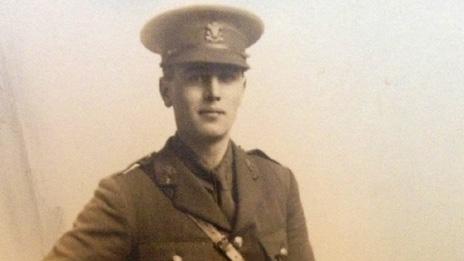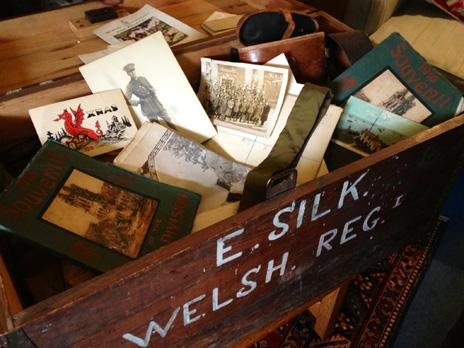World War I centenary: Wales Flanders memorial campaign
- Published
The Welsh Memorial in Flanders Campaign is planning to build a cromlech, or flagstone monument
Campaigners hoping to erect a memorial in the Flanders region of Belgium to all the Welsh soldiers who fought during World War I say they need to raise another £60,000 by September.
The Welsh Memorial in Flanders Campaign is planning to build a cromlech, or flagstone monument.
The aim is for it to be ready in time to mark the centenary of the war's outbreak in 2014.
Local people have already donated land for the memorial to be built on.
Peter Jones, the co-ordinator of the campaign in Wales, said the aim was to create a memorial honouring the sacrifices made by the many thousands of people of Welsh descent who took served in the war.
"All other nations in 2014 will be having pilgrimages to their various monuments where there will be services and commemorations and we the Welsh have nowhere to go, so this needs to be rectified," he said.
Mr Jones said that while the appeal had already raised around £11,000 and the stones for the cromlech have been donated, more was needed to secure the memorial.
"We need another £60,000 to pay for the transport of the stones to Flanders to build the monument, for engineers to work on the site and eventually to commission a large metal dragon that will sit abreast of the cromlech."
The campaign has strong support from people in Flanders who have already donated a piece of land for the memorial to be built on.
Erwin Ureel, the chairman of the Flemish branch for the appeal, said it was important to create a Welsh national memorial as a mark of respect to all those involved in the conflict.
"Whole villages gave their sons, their brothers, their fathers to defend our nation (Belgium), so I think it is very important, even if it was 100 years ago."
Plans for a memorial have a particular resonance for Paul Silk, the chair of the Silk Commission on devolution in Wales.
His father Evan Silk fought for the Welsh Regiment during World War I, rising to the rank of captain. During the conflict he was responsible for writing home to the families of fallen men.

Captain Evan Silk, of the Welsh Regiment, was responsible for writing home to the families of fallen men
Reading some of the many letters his father kept during the war, Mr Silk, from Crickhowell, Powys, described one from a WR James as particularly poignant. The letter reads:
'Terrible experience'
'Dear Sir, I'm sorry to trouble you in this time of stress and strenuous fighting, but could you possibly let me know of anything of Lieutenant E James of your glorious regiment? I've not heard from him for several months.'
Mr Silk said the letter was dated 24 October but his father had written a note on it saying 'killed in action July 27th'.
The memorial would be an important focal point, he said.
It is hoped the monument will be ready to mark the centenary of the war's outbreak in 2014
"Having a memorial where Welsh people can carry on going to remember will be an important focus for us and for future generations to go on remembering them."
Like many who served and survived the war, Captain Silk was reluctant to talk about his experiences even to his family.
"I have a clear memory of when I was quite small, at the time we had things called war mags where we read about the great exploits of British soldiers in World War II. I was proud of my father having been a soldier and I asked him how many men did he kill," said Mr Silk.
"I can still remember him looking rather sadly away from me and never answering that question."

Captain Evan Silk's trunk of World War I letters and other artefacts
Looking back, Mr Silk said: "It was clearly such a terrible experience and he took no pride whatsoever in killing others."
It is not known how many men and women of Welsh descent who fought or served in makeshift hospitals, nor the true numbers of those who lost their lives.
"The Welsh Memorial in Flanders Campaign will mark all of them," said Peter Jones. "We have almost eight months now to secure the funding we need to erect the cromlech," he said.
When the first part of the monument is completed work will then begin by locals in Flanders to create a garden of remembrance on the site, before the final piece of the jigsaw, a large metal red dragon, is placed on top of the cromlech.
The appeal is now planning a number of events this year to help raise funds including a concert in June in Morriston near Swansea where the North Wales and Morriston rugby choirs will perform.
- Published29 January 2013
- Published11 October 2012
- Published2 March 2012